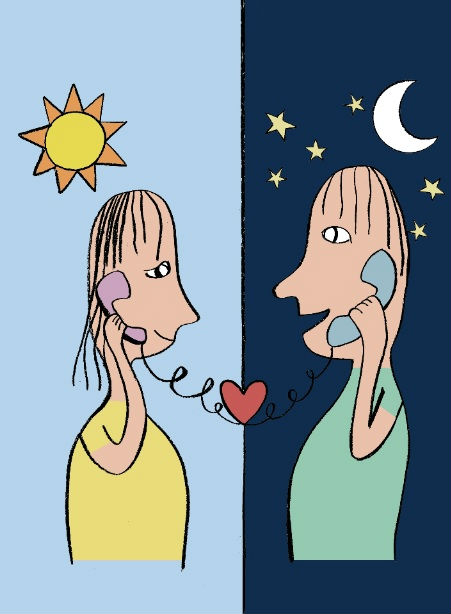Drew Mirman ’15 still remembers the warm August night when she and Addison Abdo ’14 reenacted her favorite scene from “The Notebook” in which Ryan Gosling dances with Rachel McAdams in the middle of the street.
“It was such a perfect moment,” Mirman said. “It made me realize that the long-distance relationship is so worth it if you find an amazing guy. I did, and it is so worth everything.”
Abdo, a freshman at Northeastern University, started dating Mirman in November 2013, and they have been together for 14 months. Although long-distance relationships can be hard enough when the distance is a few hours by plane, Abdo is spending his first semester studying abroad in London.
With the time difference, it can be hard for them to plan when they will Skype or talk on the phone, but they are willing to make sacrifices, even if it means saying goodbye to those extra couple hours of sleep.
“I will sometimes stay up super late, even until 4 a.m. my time, so I can Skype with Drew. It’s the only way it will work,” Abdo said.
Some students have found it difficult to cope with the stresses of long-distance relationships. With the help of technology and school breaks, however, some are able to make their relationships last.
In a 2013 study, researchers at Cornell University asked 63 couples involved in long-distance relationships to monitor how often they interacted with each other and whether by texting, video chat, calls, etc. Not only did the researchers find that frequent contact throughout the day between couples formed stronger bonds, but also that the couples felt more intimate with each other than couples who see each other on a day-to-day basis.
Tom Thorne ’14 and Jazmin Piche ’15 agree that technology makes their long distance relationship easier to maintain, although it is not the same as being together in person.
Thorne and Piche took up the title of “boyfriend and girlfriend” in May 2013, and their parents have been very supportive of their attempt to make things work while Thorne studies at Oxford University in Oxford. Because they live on opposite sides of the Atlantic, they have not seen each other in four months.
“We can send texts and see each others’ faces, though I wish Tom would use his Snapchat more so I can know what Oxford looks like,” Piche said, laughing.
“I think it works because we’d been together for over a year before going long-distance,” Thorne said. “We also communicate at least once a day and FaceTime every weekend, so we’re never out of touch.”
However, a long-distance relationship is not always a bed of roses. Some students find the distance too difficult to navigate, resulting in the end of their relationship.
Joyce* ’15 and Timothy* ’13 started dating in January 2013 and broke up at the end of December 2014. As their relationship progressed, Timothy, a college student in New Hampshire, and Joyce developed trust issues, which led to arguments that ultimately broke their relationship.
“It was exhausting and made us both sad and mad,” Joyce said. “We both felt jealous and worried constantly. It just wasn’t worth the arguments.”
After mutually deciding to break up, Joyce and Timothy no longer wanted to deal with the jealousy surrounding their long-term relationship. The former couple still talk on a weekly basis, and Joyce says there are still feelings involved.
Julia Safir ’15 also had a hard time adjusting to the distance from Gregory Lehrhoff ’14, who attends Tufts University in Boston. The two have been dating since April 2014.
“At first I craved constant texting and calling and Facetiming because I guess I was in denial of him not being here anymore,” Safir said. “It definitely made things worse, and caused me to be less present in my actual life.”
The two of them have since found “an awesome balance,” she said. “Our staple is always having goodnight phone calls that recap our days and thoughts.”
Safir and Lehrhoff also see each other at least once every month.
“It takes such a load off of me to be able to see her face,” Lehrhoff said. “When you’re in unfamiliar surroundings, a glimpse of the familiar means so much more. So I think in that sense, the distance and the ability to use modern technology have strengthened our relationship.”
Maddie Oswald ’15, who is dating Columbia University student Matt Karo ’14, believes that being self-sufficient helps them deal with the distance.
“Our relationship works so well because we communicate a lot, plan and talk about the future, but we also let each other live independently,” Oswald said. “We know it will be lot easier next year since we will both be on the East Coast, a three-hour train ride away.”
Romantic surprises also help. Karo was supposed to come home on a Friday for Winter Break, and the night before his anticipated arrival, Oswald had just turned out the lights and gone to bed when Karo came walking through her bedroom door.
“I thought I was dreaming,” Oswald said.
Despite the hardship of distance, Abdo and Mirman also believe that love conquers all.
“She is the most amazing girl I have ever met,” Abdo said. “I don’t know what I would do without her,” Abdo said.
*Names have been changed































